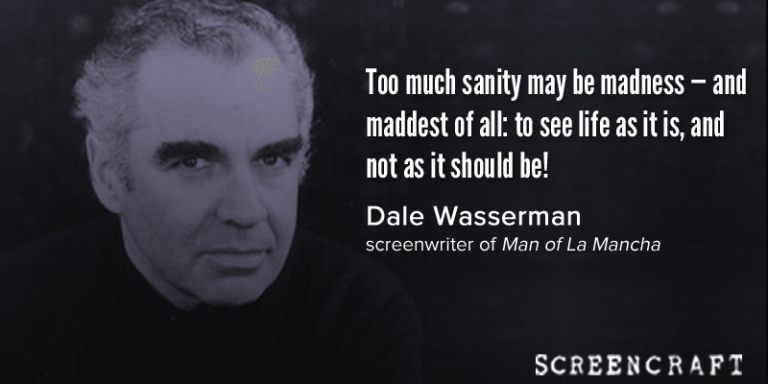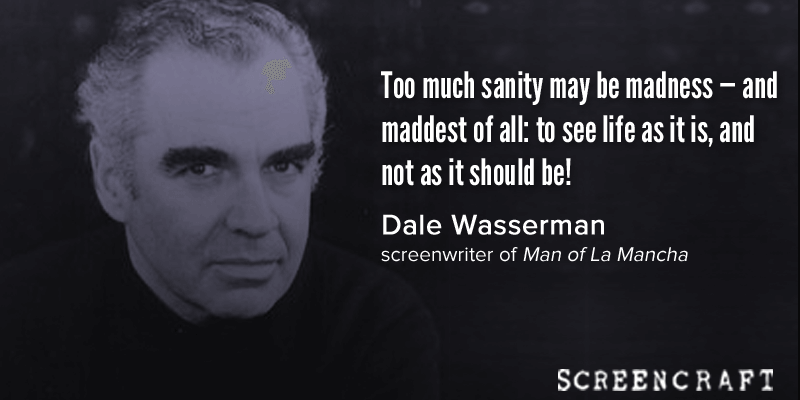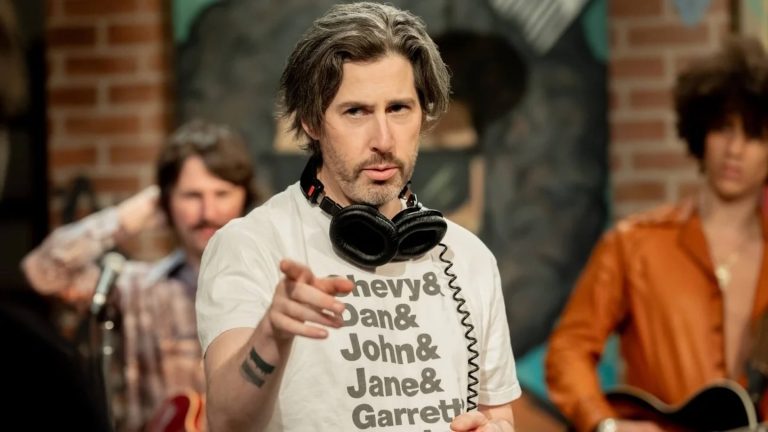Words of Writing Wisdom from Iconic Writer Dale Wasserman

Dale Wasserman, who passed away at the age of 94 back in 2008, was a Wisconsin native — orphaned at the age of nine. He later resided in a state orphanage with his older brother in South Dakota before he hit the rails. "I'm a self-educated hobo. My entire adolescence was spent as a hobo, riding the rails and alternately living on top of buildings on Spring Street in downtown Los Angeles. I regret never having received a formal education. But I did get a real education about human nature."
Needless to say, Wasserman persevered after a life situation where most would have disappeared into anonymity. He became a self-taught lighting designer, director, and producer for the stage — even producing and directing abroad in places like London and Paris.
His writing ambitions began during the middle of directing a Broadway musical, which he refused to name. He abruptly walked out of the stage production, later stating that he "couldn't possibly write worse than the stuff [he] was directing... Every other function was interpretive; only the writer was primary." He left his previous occupations to become a writer.
Wasserman's notoriety will be forever linked to his work as the playwright behind the stage adaptation of Ken Kesey's novel One Flew Over the Cuckoo's Nest, which we all remember later as the Oscar-winning film of the same name starring Jack Nicholson and produced by a young Michael Douglas whose father Kirk Douglas had starred in the iconic role of McMurphy on stage.
"I wanted to turn it into a movie. So did Kirk Douglas, who wanted the starring role, although he wanted to do it on Broadway first," Wasserman told Backstage. "Kirk Douglas and I knew each other. That doesn't mean we liked each other, but we decided to work on the project together. I wrote the script and then Kirk brought in three writers — I call them submarines — to work on it some more."
He went on to say, "What they finally produced [in 1963] was not my play at all and the reviews were just dreadful. Kirk decided to make McMurphy loveable, heroic, and endearing. McMurphy should be an ambiguous character — part con-man, part Christ figure."
In 1975, when Michael Douglas, Kirk's son, decided to produce the film, Wasserman played no role in the screen adaptation and has no regrets.
"The movie was good, but it is neither the novel nor the play. It's aggressively realistic. None of the surrealistic elements on stage [one of the featured characters has hallucinatory moments that are dramatized] were in the film and without them the script has little value."
Beyond his outstanding stage work, Wasserman was also a well-utilized writer for the screen. His screenwriting work includes The Vikings, Cleopatra, Quick Before It Melts, Mister Buddwing, A Walk With Love and Death, and the celebrated Man of La Mancha, based on his stage play.
He would have been 103 this year. In celebration of his work and of his wise words on writing, we share some of the best Dale Wasserman quotes and apply them to the writer's journey with further elaboration on how writers can apply them to their own work.
"When I wrote the phrase the impossible dream — and often, I’ve regretted writing it — I meant literally the dream is impossible, but the continual striving toward it is the point, and not the achievement."
Too many writers focus on the end goal, aspirations, and dream scenarios of becoming a successful writer — be it for the stage, print, or screen. The big paycheck, the best-selling novel, the Oscar, the Tony, the Emmy, and the fame.
While such dreams are understandable and keep writers motivated, the journey is actually the reward — the true achievement. Those dreams that are possible are often not what you, the writer, will achieve. Instead, the fates will bring you where you were always destined to be. The true dream realized is conjuring amazing characters, building amazing worlds, and telling amazing stories. Everything else beyond that is just icing on the cake.
"I never have become a writer and never will. But I am continually working at it and I hope that I may even become better than I have been."
Working off of Wasserman's notion that the continual striving toward a dream is the point, this next quote further explores the wise notion that a writer never truly reaches a final level of achievement. You must always continue to challenge yourself and grow as a writer. Complacency is poison. It kills the necessary inspiration needed to continue on writing compelling work.
And another interpretation of this quote is ever-prevalent in Hollywood. Many screenwriters feel that once they have written a script that garners them major representation, they've made it. Then once they've finally sold something, they've made it. Then when something they've sold or been hired for is produced, they've made it. And when they've finally won awards for their work, they've made it.
Whenever any one of these accomplishments has been made, you must always remember that it doesn't stop there. You can have major representation, and never sell anything. You can sell something, but your work is never produced. You can get something of yours produced, and then never have your screenwriting see the light of day again.
You have to continually work at becoming better than you ever have been.
"Illusion makes the hardships of life possible to survive. Life, for most people, is somewhere between a burden and a positively awful experience, with gleams here and there of sunshine. But illusion—being pretty much a function of imagination—makes possible the belief in other possibilities in life, in better worlds, in improvements which may or may not happen; but so long as the belief in them persists, life is given added value thereby."
This quote speaks of the two magical elements of storytelling.
Movies, shows, plays, and novels offer an illusion for the audience and readers. An illusion that helps them through this difficult journey we call life. They can inspire us. They can make us laugh or cry. They can allow us to look inward and reflect. Or they can just offer imaginative escapism as we turn our backs to the trials and tribulations of life each and every day.
Secondly, being a storyteller can offer the same type of therapy, for lack of a better word. Writers are illusionists that utilize the imagination of others to tell a story, but they also can work out their own demons and reflections that they are fighting with in their own lives.
In short, the cinema matters. The stage matters. The novel matters. In so many more ways than one.
"I don't believe in competition with other writers."
Wasserman was specifically referencing his disdain for awards — Oscars, Tonys, Honorary Doctorates — but the quote is applicable to the notion that writers should be less focused on who has written what, and instead focus on what they themselves want to accomplish.
In Hollywood, trends are all the rage because the broken Hollywood development system is risk averse and often displays to writers the need to write what has been proven successful before. However, a majority of the films that are successful and change the way Hollywood thinks are those that are new and original. Thus, writers should focus less on what everyone else is writing, and instead be more concerned with telling their own stories that they have a passion for.
"I come in a world of iron... to make a world of gold."
This quote from Wasserman's Man of La Mancha play and film can be easily interpreted into the world of the screenwriter, playwright, or novelist. As he stated before, this world we live in and the lives we lead can be so difficult. In that essence, the real world is made of iron.
The inspiring thing about storytelling is that writers can turn that world of iron into a world of gold through the magic of the screen, page, and stage. Others that don't understand this passion and trade can often push aside — or tip their noses up at — the aspirations of the writer, and this can have a debilitating effect on them as they struggle to tell their stories and often receive endless rejection as they try to share them to Hollywood, the stage, and the publishing business.
So remember, you, the writer, can make worlds of gold. You can change people's perspectives on it. You can give them hope. You can make them laugh when they need to laugh, cry when they need to cry, be inspired when they need to be inspired, or help them to forget when they need to forget.
Writing matters. Storytelling matters.
Ken Miyamoto has worked in the film industry for nearly two decades, most notably as a studio liaison for Sony Studios and then as a script reader and story analyst for Sony Pictures.
He has many studio meetings under his belt as a produced screenwriter, meeting with the likes of Sony, Dreamworks, Universal, Disney, Warner Brothers, as well as many production and management companies. He has had a previous development deal with Lionsgate, as well as multiple writing assignments, including the produced miniseries Blackout, starring Anne Heche, Sean Patrick Flanery, Billy Zane, James Brolin, Haylie Duff, Brian Bloom, Eric La Salle, and Bruce Boxleitner. Follow Ken on Twitter @KenMovies
For all the latest ScreenCraft news and updates, follow us on Twitter and Facebook!
Tags
Get Our Screenwriting Newsletter!
Get weekly writing inspiration delivered to your inbox - including industry news, popular articles, and more!



























